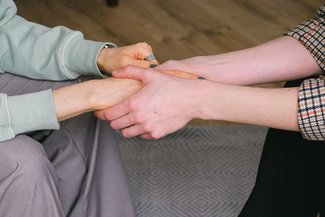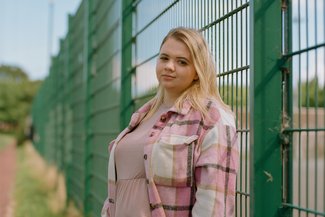"We met recently and talked about what “the story” looks like for women with lived experience. We’ve written this together to talk about our experiences as a group of women who have used services and experienced multiple unmet needs.
As women, we have felt victimized by the system during our lives. It often begins at an early age when girls are punished for their behaviour rather than recognising they actually need support. When you have school friends in hospital because they have been stabbed, you find yourself feeling lucky that he didn’t actually manage to rape you. Because violence against women is so common, girls accept this as normal and even in extreme cases we learn that systems don’t provide support and protection and we just have to look out for ourselves. The doors are just always being shut the whole time and you can feel you have no-where to turn. There’s no mental health support or education about healthy relationships for young girls. It’s hard now with our own kids and girls in our community because we know what’s coming but there’s nobody to guide them.
One of our shared experiences is being shut out when you ask for help. There’s nobody to ask on your behalf, or advocate for you fairly. It’s so hard to be an advocate for yourself when you feel battered by the system. At the moment, the support that you get very much comes down to luck. It’s a lottery. If you live close to a women’s centre, or specialist support, you might get help. But, what if you don’t know about this support? What if you’re left alone without help and shut out? What if you approach those services but are made to feel ashamed or that doing so is a risk for you and your family. That’s the reality that many women face.
The system is often cruel and stigmatizing. At times, workers can feel just like robots who perform the tasks but don’t see you as a person. We’ve often struggled to trust people because there’s no compassion or empathy shown to us. You feel worthless and often this feeling is made worse by services which should be supporting you. If you’ve been through abuse, addiction, or child removal, all you want is to be seen as a real person and treated with compassion. Often, we just feel blamed for our own experiences. If you go through domestic abuse or violence, you can be left with no support afterwards. When you don’t even feel safe in your own home, it can feel like living in a war zone. Where do you turn or what do you turn to? Self-medicating can be the only way you know that allows you to escape your reality at least for a while. Left alone, you can spiral. You aren’t living, you are existing. It’s so difficult because once you lose trust in services, it’s very hard to build that back. There are only so many times you can feel failed before you give up and don’t see the point. Too many women are failed by the system and their problems escalate.
When women are mothers, they always get asked about their children when they seek help. But men don’t get asked the same questions. For example, if you’re going through addiction, it’s hard to get support, without being asked about your kids. Then, women get so scared about their kids being taken away, that they don’t want to disclose what they’re going through and don’t reach out for the help they need. It feels like there this huge double standard for women. We also discussed the lack of spaces for women to come together and really would love to see more places for women, where we’re not shut out or left feeling unsafe and can support each other as a community. For most of us, the best support has come from others with similar experiences.
One of the most difficult things is watching people around you in your community lose their lives. For example, some of us know people who have lost their best-friends, partners, parents and children to addiction. But there’s no help with that grief. You’re just left with it. It petrifies us. When we met as a group, we talked about how this is also because of stigma. If a middle class person had lost that many loved ones, they’d get support. Yet there is so much we can’t take for granted – being safe, having those you care about around you, the ability to feel love. But lots of women are just forgotten about because they’re judged negatively.
We also talked about services that have worked for us. For example, some of us have had positive experiences with social workers, but that’s changed so much over the years. It now just feels like a tick-box exercise rather than working with people who care. We’ve had some positive experiences with specialist mid-wives but then been really judged by other nurses. It can be a real mixed bag, but when people treat you like you’re a human and show you compassion, it makes a huge difference.
One of the main challenges that we discussed was the support network slipping away more and more. Sure Start centers, charities and women’s centres have been instrumental to many of us during difficult times. But, all we hear today is that these centres are closing and its scary to think about what things will look like in the future and the impact that will have for our girls and the generations after…
We all agree that peer support and working with women with lived experience is so important, but it just doesn’t happen enough. When we were talking about the story for women, we kept coming back to the phrase “cycle of harm” which pushes women into the gutter, preventing them from getting the help they need. Most of us can identify someone who believed in us and gave us the support and confidence to help break that cycle.
Sometimes it's a simple phrase like “you are too valuable to lose” which can save a life. But we are the lucky ones, here sharing our experiences. We want this project to create safe spaces for women, to support each other in a community and for services to work together so they are all trying to find ways they can break the cycle of harm and give these women a chance."




